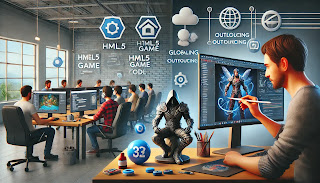The metaverse is rapidly shaping up to be the future of digital interaction,
blurring the lines between virtual and real-world experiences. At the heart
of any immersive metaverse environment lies the quality of its characters—
avatars that represent users, NPCs that enhance world-building, and interactive
entities that drive engagement. And when it comes to building rich, immersive,
real-time experiences, 3D character art in Unreal Engine is proving to be a
game-changer.
Why Unreal Engine for Metaverse Character
Development?
Unreal Engine is considered the gold standard for high-fidelity, real-time
rendering. With its powerful capabilities like Nanite, Lumen, and Metahuman
Creator, it empowers developers to create lifelike characters that breathe,
emote, and interact with the virtual world in real time. For any unreal engine
development company aiming to design next-gen metaverse games, the
character art must go beyond visuals. It must reflect identity, emotion, and
personalization. This is where Unreal shines—its toolset enables seamless
integration of complex animations, realistic skin shaders, customizable clothing,
and dynamic facial expressions.
The Role of 3D Character Artists in Metaverse
Projects
A 3D character artist for hire plays a pivotal role in shaping the user's virtual
identity. Whether you’re developing a social metaverse platform, a virtual
concert environment, or a gamified enterprise world, the characters are what
users interact with—and often as. These artists contribute to everything from
initial creative ideation and concept sketches to digital sculpting in tools like
ZBrush or Blender. They are responsible for preparing game-ready models
through optimized topology, creating realistic textures for skin, hair, and outfits,
and rigging characters for both facial and body animation. In metaverse projects,
customization is vital, and experienced artists create modular characters that
users can personalize in real-time—adding to the immersion and user engagement.
Leveraging Unreal Engine Tools for Character
Realism
One of Unreal’s standout features for the metaverse is its Metahuman Creator,
which allows for the rapid development of photorealistic digital humans.
However, while Metahuman serves as a solid foundation, many metaverse
games require stylized or branded characters that go beyond the template.
This is where custom 3D character art becomes essential. Advanced lighting
with Lumen ensures dynamic environmental responsiveness, enhancing
realism down to the smallest details like skin pores and fabric textures. Nanite,
Unreal’s virtualized geometry system, allows for the use of high-poly models
without performance compromises—enabling richly detailed costumes, facial
expressions, and simulations that would be otherwise impossible in real-time engines.
Metaverse Use Cases Demanding Quality 3D
Character Art
The demand for high-quality character art is growing across various metaverse
applications. In virtual events and concerts, lifelike artist avatars deepen fan
engagement. Social VR platforms depend on expressive avatars that reflect
personal identity, enhancing user interaction and emotional connection.
Enterprise training simulations use realistic NPCs to make learning scenarios
feel more authentic and engaging. Digital fashion shows within the metaverse
also rely on high-end 3D character art to showcase clothing with accurate
fabric physics, movement, and lighting—an experience only possible through
Unreal Engine’s capabilities.
Why Work With an Unreal Engine Development
Company?
Developing, optimizing, and integrating 3D characters for the metaverse is a
complex, collaborative effort. Working with an experienced unreal engine
development company ensures every aspect of character creation is handled
by experts, from the initial art pipeline to technical engine integration. These
companies offer not only deep expertise in Unreal’s rendering and optimization
systems but also deliver scalable asset pipelines for large metaverse
applications. They support deployment across VR, AR, desktop, and mobile
platforms while ensuring characters are optimized for performance and quality.
Many also offer the option to engage a 3D character artist for hire on a project
basis, giving studios the flexibility to scale their art production without building a
full in-house team.
Final Thoughts
As the metaverse becomes more sophisticated and user expectations continue
to rise, 3D character art will play a defining role in shaping digital presence,
immersion, and interaction. Unreal Engine offers a cutting-edge platform to
bring those characters to life, providing unparalleled visual fidelity and real-time
performance. For companies looking to make an impact in the virtual space,
hiring a professional 3D character artist or collaborating with a trusted unreal
engine development company is not just an advantage—it’s a necessity.




.jpg)

